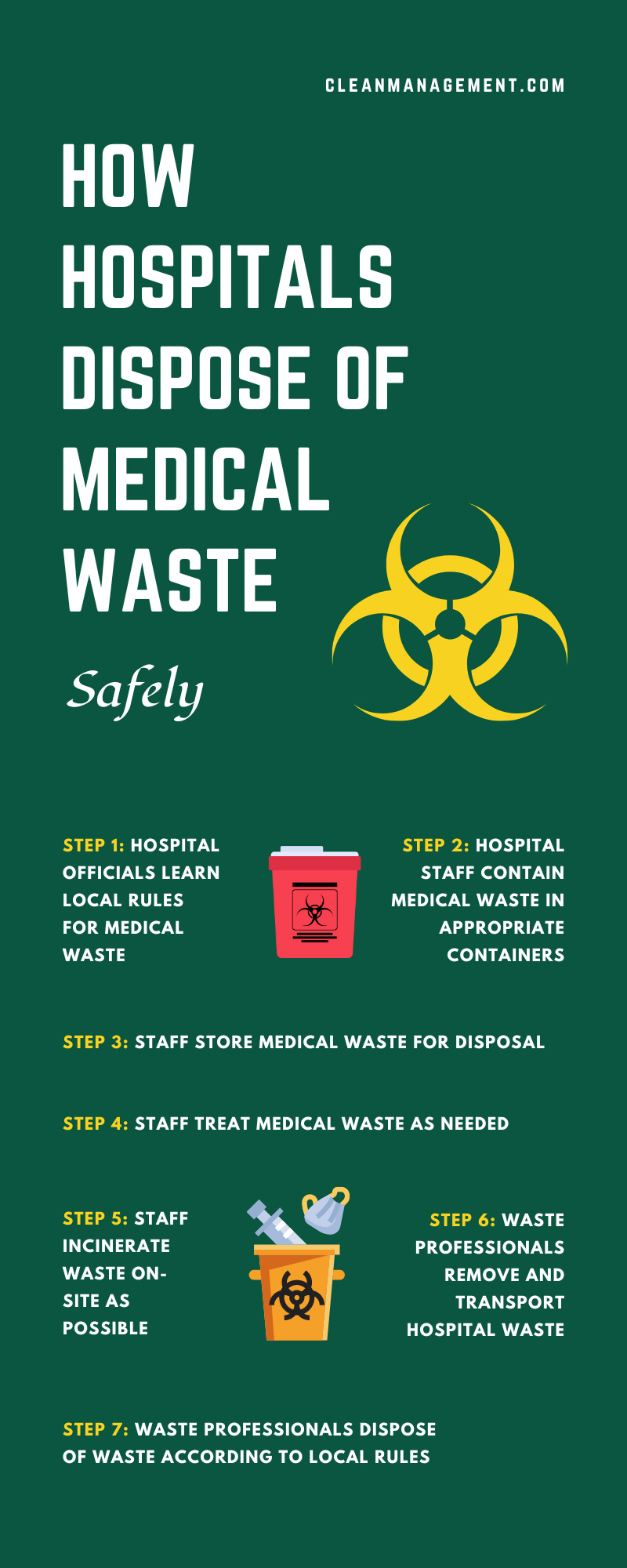Reliable Medical Waste Disposal Services: Partnering for a Cleanser Environment
Wiki Article
Liable Solutions: Recognizing Medical Garbage Disposal Services
In the realm of medical care, the correct disposal of medical waste is an essential facet that requires cautious factor to consider. As medical care facilities generate numerous types of waste that call for specific handling, recognizing the subtleties of medical waste disposal services is extremely important.Significance of Appropriate Medical Garbage Disposal
Appropriate medical waste disposal is vital in maintaining a sanitary and safe setting within health care centers. In medical care settings, numerous kinds of waste are generated daily, including infectious products, sharps, expired medications, and chemical compounds. If not correctly managed, these wastes can posture serious dangers to both health care employees and the public. Improper disposal can cause the spread of infections, injuries from sharps, contamination of water sources, and injury to the atmosphere.

Kinds Of Clinical Waste
Within healthcare centers, a diverse array of waste products identified as clinical waste is created, each needing specific handling and disposal methods. Clinical waste can be categorized right into several types based on its characteristics and possible threats. Contagious waste, such as utilized societies, swabs, and needles, positions a considerable threat of spreading infections and need to be meticulously managed to avoid any type of potential injury. Contaminated materials consists of chemicals, drugs, and certain materials that might be toxic or responsive. These materials call for specific disposal approaches to reduce environmental impact and ensure security. Pathological waste, that includes tissues, body organs, and body parts, requires proper disposal to appreciate the self-respect of the dead and avoid any biohazards. Lastly, pharmaceutical waste, like run out medicines and radiation treatment drugs, need to be thrown away appropriately to stop misuse or ecological contamination. Understanding the various types of medical waste is crucial for health care facilities to execute reliable waste monitoring techniques and secure public health and wellness and the atmosphere (Medical Waste Disposal Services).Regulations and Conformity
Healthcare centers have to stick to strict laws concerning the handling and disposal of clinical waste to make sure conformity with legal needs and protect public health and wellness. These guidelines are established to stop the spread of infections, protect the environment, and maintain the security of healthcare employees and the general public. Different governing bodies, such as the Epa (EPA), the Occupational Safety and Wellness Management (OSHA), and the Department of Transport (DOT), have certain standards that healthcare facilities have to follow.To abide with these laws, medical care facilities have to effectively set apart, shop, transportation, and dispose of different kinds of medical waste. This includes sharps you can try these out waste, contagious waste, contaminated materials, you could try this out and pharmaceutical waste, each requiring specific handling treatments. Facilities needs to likewise maintain precise documents of waste generation and disposal to demonstrate conformity during inspections.
Non-compliance with medical waste laws can lead to serious penalties, fines, and damages to the facility's track record. As a result, it is crucial for health care centers to stay notified concerning the current laws and execute robust conformity steps to shield public health and wellness and the atmosphere.
Advantages of Specialist Disposal Providers
Involving professional clinical waste disposal services offers health care centers a reputable and efficient solution for managing harmful materials. By outsourcing this crucial job to professionals, health care facilities can guarantee conformity with policies while focusing on supplying quality treatment to patients. One of the vital benefits of professional disposal services is the competence they offer the table. These services utilize skilled specialists that are fluent in taking care of various kinds of clinical waste, guaranteeing proper partition, disposal, product packaging, and transport.Moreover, expert disposal solutions utilize modern devices and comply with sector ideal techniques to minimize environmental impact and lower the risk of contamination. This not only advertises a safer workplace for medical care staff yet also adds to total public wellness and safety and security. Furthermore, contracting out medical waste disposal can result in set you back financial savings over time by getting rid of the requirement for internal management and disposal systems.
Lasting Practices in Medical Care

One key lasting practice in healthcare is waste reduction. By executing methods to reduce unnecessary product packaging, single-use products, and overall waste generation, healthcare centers can significantly decrease the quantity of waste sent out to garbage dumps or incineration. Furthermore, recycling programs for materials like glass, paper, and plastic can additionally lower the ecological influence of healthcare operations.

Conclusion
Finally, proper clinical waste disposal is crucial in maintaining a healthy and balanced and risk-free environment for both healthcare workers and the general public. Understanding the various types of clinical waste, complying with regulations and conformity Extra resources standards, and utilizing expert disposal services are important action in responsible waste management. By embracing lasting methods in healthcare facilities, we can lower environmental effect and guarantee the wellness of all people associated with the health care industry.As healthcare centers create different types of waste that require customized handling, understanding the subtleties of clinical waste disposal services is vital.Within healthcare centers, a varied selection of waste materials identified as clinical waste is created, each needing details handling and disposal techniques. Understanding the different types of clinical waste is vital for healthcare centers to execute effective waste management approaches and protect public health and wellness and the setting.
By carrying out strategies to lower unneeded product packaging, single-use things, and total waste generation, health care facilities can considerably decrease the quantity of waste sent out to land fills or incineration. Understanding the various kinds of clinical waste, following guidelines and compliance criteria, and making use of professional disposal services are necessary actions in responsible waste administration.
Report this wiki page